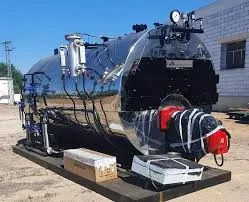
Nov . 14, 2024 07:09 Back to list
steam boiler function
Understanding the Function of Steam Boilers in Industrial Applications
Steam boilers play a crucial role in various industrial applications, serving as vital components in heating systems, power generation facilities, and manufacturing plants. The fundamental function of a steam boiler is to convert water into steam through the application of heat, which can then be used for an array of purposes, from providing power to driving machinery, to heating processes in various industries. This article will delve into the workings of steam boilers, their types, applications, and the importance of maintenance.
The Basics of Steam Boiler Operation
At its core, a steam boiler operates on the principle of heat exchange. The boiler consists of a closed vessel where water is heated to produce steam. The primary components of a steam boiler include the burner, combustion chamber, heat exchanger, and steam outlet. Fuel, typically natural gas, oil, or coal, is burned, producing heat. This heat is transferred to the water within the boiler, raising its temperature until it reaches the boiling point and converts into steam.
The produced steam is then directed to various systems that require heat or pressure, such as turbines in power plants, heat exchangers in HVAC systems, or directly for industrial heating processes. The ability to generate steam efficiently and safely is critical for the operational success of many industries.
Types of Steam Boilers
There are several types of steam boilers, each designed for specific applications and operating conditions
1. Fire-Tube Boilers In fire-tube boilers, hot gases from combustion pass through tubes that are surrounded by water. Heat from the gases transfers to the water, generating steam. These boilers are typically small and suitable for low-pressure applications.
2. Water-Tube Boilers Unlike fire-tube boilers, in water-tube boilers, water flows through tubes that are surrounded by hot combustion gases. This design allows for higher pressure and temperature capabilities, making them suitable for large-scale industrial operations.
3. Electric Boilers Electric boilers use electrical energy to heat water, producing steam. They are often used in applications where clean steam is necessary, such as in food processing or pharmaceutical manufacturing.
steam boiler function

4. Combi Boilers Combination boilers provide both heating and hot water on demand. They are commonly used in residential setups as well as in small commercial operations.
Applications of Steam Boilers
Steam boilers are utilized in a wide range of industries, including
- Power Generation In thermal power plants, steam generated from boilers drives turbines that produce electricity. - Manufacturing Factories use steam for various processes, including sterilization, distillation, and material processing. - Heating Systems Steam boilers are widely used in heating installations for buildings, ensuring a continuous supply of hot water or steam for heating. - Food Processing Steam is essential in cooking, canning, and pasteurization processes in the food industry.
The versatility of steam boilers makes them indispensable in modern industrial practices.
Importance of Maintenance
The efficient and safe operation of steam boilers relies heavily on regular maintenance. Poorly maintained boilers can lead to significant safety risks, including explosions, water leaks, and inefficient operation. Routine inspections, cleaning, and servicing are essential to ensure all components, such as pressure gauges, valves, and safety devices, are functioning properly.
Operators should monitor boiler pressure and temperature closely and perform regular water quality tests. Scale buildup, corrosion, and sediment accumulation can hinder performance and reduce the lifespan of the boiler. Implementing preventive maintenance programs can help to minimize downtime and costly repairs, ensuring that steam systems operate efficiently.
Conclusion
Steam boilers serve as the backbone of many industrial processes, providing necessary heat and pressure for a variety of applications. Understanding the different types of steam boilers and their functions allows industries to select the appropriate system for their needs. Regular maintenance and operational checks are critical to ensure efficiency, safety, and longevity of these essential machines. As industries continue to evolve, steam boilers will remain a foundational element of energy and process management in a wide array of applications.
-
How to Maintain a Steam Boiler Expert Tips for Efficiency & Longevity
NewsApr.29,2025
-
Professional Steam Boiler Service AB Expert Maintenance & Repair
NewsApr.29,2025
-
Hot Water Steam Boilers Efficient Heating Solutions & Expert Tips
NewsApr.29,2025
-
Hot Water Boiler Capacity Calculation Guide Efficient Design Tips
NewsApr.28,2025
-
How to Drain a Steam Boiler Step-by-Step Safety Guide
NewsApr.28,2025
-
How to Install a Hot Water Boiler Optimal Pressure & Efficiency Guide
NewsApr.28,2025
Related PRODUCTS






















